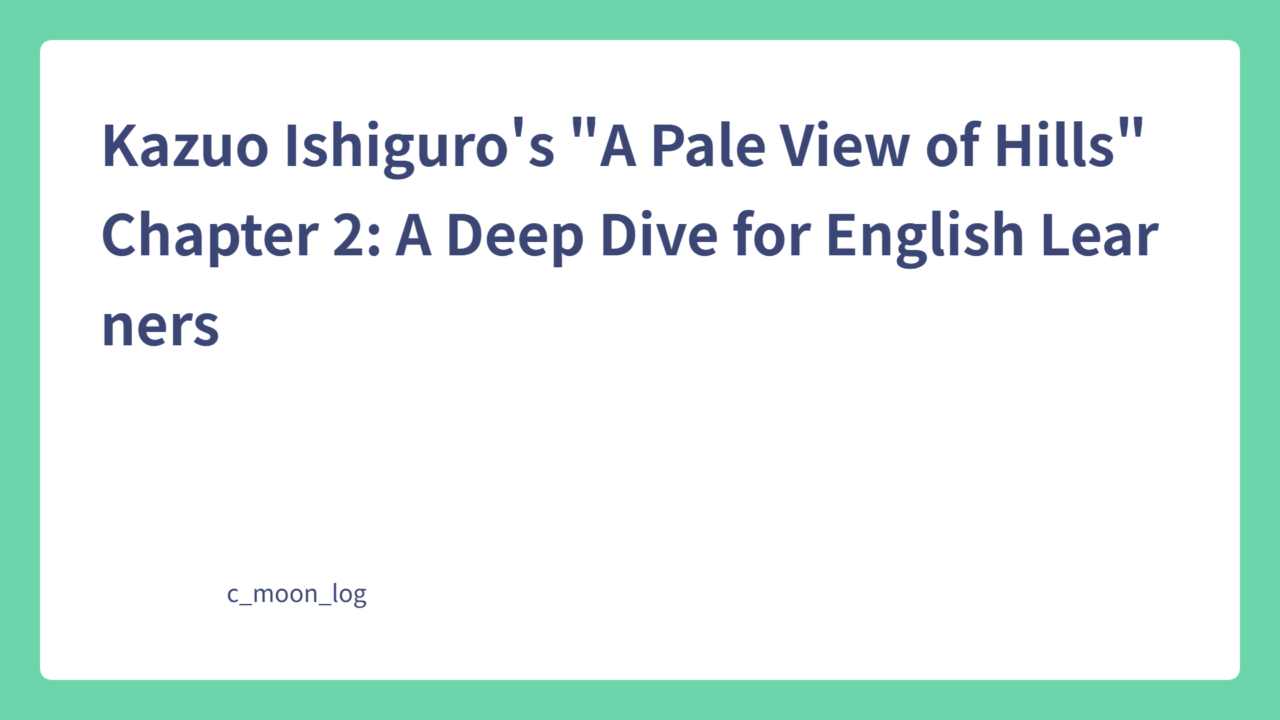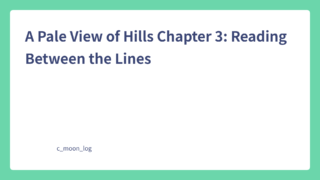「記憶の迷宮を英語で歩く」カズオ・イシグロ『遠い山なみの光』第2章で学ぶTOEIC英語

カズオ・イシグロ『遠い山なみの光』第2章を、英語やTOEICに熱心なあなたに向けて全力で解説などします。
Kazuo Ishiguro’s “A Pale View of Hills” Chapter 2: A Deep Dive for English Learners
ノーベル文学賞作品を通じた英語学習の旅へGO!
📚
Learning English through Nobel Prize Literature
📖 まずは本を手に入れよう!
この記事を最大限活用するために、カズオ・イシグロの名作『遠い山なみの光』をお手元に用意することをお勧めします。英語学習とTOEIC対策に最適な一冊です!
✨ 送料無料・楽天ポイント還元でお得にゲット!
Are you ready to unlock the secrets of advanced English through one of literature’s most subtle masters? Ishiguro’s debut masterpiece holds the key to sophisticated vocabulary, complex grammar, and cultural nuances that will elevate your TOEIC score and transform your English communication skills forever.
楽天ブックスで英語版「A Pale View of Hills」を今すぐ購入
🌟 Chapter Overview: Memory’s Fragile Dance
第2章の概要:記憶の儚い舞踏
Welcome back to our journey through Ishiguro’s masterpiece! In Chapter 2, we dive deeper into Etsuko’s memories of post-war Nagasaki. The narrative becomes more complex as past and present intertwine like morning mist over those pale hills.
イシグロの傑作を巡る旅へようこそ!
第2章では、戦後長崎でのエツコの記憶により深く踏み込みます。
過去と現在が、あの淡い山なみにかかる朝霧のように絡み合い、物語はより複雑になっていきます。
Key Theme: The unreliability of memory and its power to both heal and haunt us.
主なテーマ:記憶の不確実性と、それが私たちを癒し、同時に悩ませる力
📖 Plot Summary: What Happens in Chapter 2
あらすじ:第2章で起こること
Chapter 2 takes us further into Etsuko’s recollections of her life in Nagasaki during the 1950s. We meet more characters from her past, including her enigmatic friend Sachiko and her troubled daughter Mariko. The chapter explores themes of displacement, cultural change, and the psychological aftermath of war.
第2章では、1950年代の長崎でのエツコの人生の回想がさらに詳しく語られます。
謎めいた女性サチコと問題を抱えた娘マリコを含む、彼女の過去の登場人物たちに出会います。
この章では、居住地の移転、文化の変化、戦争の心理的後遺症というテーマが探求されます。
Main Events:
主な出来事:
- Etsuko recalls conversations with Sachiko about life and choices
エツコが人生と選択について語ったサチコとの会話を思い出す - We learn more about the social atmosphere of post-war Japan
戦後日本の社会情勢についてより詳しく知る - The relationship between mothers and daughters becomes central
母と娘の関係が中心的なテーマとなる - Subtle hints about future tragedies emerge through careful dialogue
注意深い対話を通じて、将来の悲劇への微妙な暗示が現れる
🎯 TOEIC Power Vocabulary from Chapter 2
第2章からのTOEIC重要語彙
Level 1: Essential Business English
レベル1:必須ビジネス英語
1. “circumstances” (状況)
- Example from text: “Given the circumstances, she had little choice.”
テキストからの例:「その状況を考えると、彼女にはほとんど選択肢がなかった。」 - TOEIC Context: “Due to unforeseen circumstances, the meeting has been postponed.”
TOEICでの使用例:「予期せぬ事情により、会議は延期されました。」 - Usage Tip: Perfect for explaining situations in business emails!
使用のコツ:ビジネスメールで状況を説明するのに最適!
2. “considerable” (かなりの)
- Literary use: “She showed considerable patience with her daughter.”
文学での使用:「彼女は娘に対してかなりの忍耐を示した。」 - Business use: “We’ve made considerable progress on the project.”
ビジネスでの使用:「プロジェクトでかなりの進歩を遂げました。」 - Memory Trick: Consider + able = worth considering = significant!
記憶のコツ:Consider(考慮する)+ able(できる)= 考慮する価値がある = 重要!
3. “prospects” (見通し)
- In the novel: “Her prospects seemed uncertain at best.”
小説での使用:「彼女の見通しは、よく見積もっても不確実だった。」 - TOEIC favorite: “The company’s prospects for next quarter look promising.”
TOEIC頻出:「来四半期の会社の見通しは有望に見える。」 - Note: Can mean both “future possibilities” and “potential customers”
注意:「将来の可能性」と「見込み客」の両方の意味がある
Level 2: Advanced Expressions
レベル2:上級表現
4. “disposition” (性質、気質)
- Ishiguro’s use: “She had a gentle disposition despite her troubles.”
イシグロの使用:「彼女は困難にもかかわらず、穏やかな気質を持っていた。」 - Professional context: “His calm disposition makes him ideal for customer service.”
専門的文脈:「彼の冷静な性格は、カスタマーサービスに理想的だ。」 - Cultural note: Often used to describe personality traits politely
文化的注意:性格的特徴を丁寧に表現するためによく使われる
5. “prevailing” (支配的な、一般的な)
- Literary context: “The prevailing mood was one of quiet resignation.”
文学的文脈:「支配的な雰囲気は静かな諦めのものだった。」 - Business usage: “We need to adapt to prevailing market conditions.”
ビジネスでの使用:「一般的な市場状況に適応する必要がある。」 - Grammar point: Often followed by conditions, attitudes, or opinions
文法のポイント:しばしばconditions(状況)、attitudes(態度)、opinions(意見)が続く
💡 Grammar Spotlight: Ishiguro’s Subtle Style
文法スポットライト:イシグロの繊細なスタイル
The Power of Understatement
控えめな表現のチカラ
Ishiguro masters the art of saying more with less:
イシグロは少ない言葉でより多くを語る技術をマスターしています:
❌ Direct: “She was very sad and cried a lot.”
❌ 直接的:「彼女はとても悲しくて、たくさん泣いた。」
✅ Ishiguro style: “She seemed somewhat troubled by recent events.”
✅ イシグロ風:「彼女は最近の出来事にいくらか心を乱されているようだった。」
Why this matters for TOEIC:
なぜTOEICで重要?:
- Part 7 reading passages often use subtle language
パート7の読解問題ではしばしば繊細な言葉遣いが使われる - Understanding understatement helps with inference questions
控えめ表現の理解は推論問題に役立つ - Professional English favors diplomatic, indirect expression
専門的な英語では外交的で間接的な表現が好まれる
Memory Markers in Narrative
物語における記憶の目印
Notice how Ishiguro signals shifts between past and present:
イシグロが過去と現在の間の移行をどのように示すかに注目してください:
- “I remember…” (記憶している)
- “It occurs to me now…” (今思うに)
- “Looking back…” (振り返ってみると)
TOEIC Application: These phrases appear in Part 3/4 when speakers reflect on past experiences.
応用:これらのフレーズは、話者が過去の経験を振り返るパート3/4で現れます。
🧩 Cultural Context: Post-War Japan Through English Eyes
文化的背景:英語の目を通した、戦後の日本
Social Changes After WWII
第二次世界大戦後の社会変化
Chapter 2 subtly depicts Japan’s transformation:
第2章は日本の変革を巧妙に描いています:
Traditional values ⚔️ Western influence
伝統的な価値観 ⚔️ 西洋の影響
- Family duty vs. individual choice
家族の義務 vs. 個人の選択 - Arranged marriages vs. love marriages
お見合い結婚 vs. 恋愛結婚 - Rural life vs. urban opportunities
農村生活 vs. 都市の機会
Key Vocabulary for Cultural Topics:
文化的話題の重要語彙:
- “traditional values” (伝統的価値観)
- “social upheaval” (社会的激変)
- “generational conflict” (世代間対立)
- “cultural assimilation” (文化的同化)
TOEIC Tip: Cultural change topics frequently appear in Part 7 passages!
コツ:文化変化の話題はパート7の文章によく出てきます!
🎭 Character Analysis: Reading Between the Lines
登場人物の分析:行間を読む
Sachiko – The Mysterious Friend
サチコ – 謎めいた友人
Direct description: “Sachiko lived nearby with her daughter.”
直接的な描写:「サチコは娘と一緒に近くに住んでいた。」
Hidden meaning: She represents choices Etsuko might have made differently.
隠された意味:彼女はエツコが違った選択をしていたかもしれない可能性を表している。
Advanced vocabulary for character analysis:
登場人物分析のための上級語彙:
- “enigmatic” (謎めいた) – mysterious and hard to understand
「謎めいた」- 神秘的で理解しにくい - “ambivalent” (両価的な) – having mixed feelings
「両価的な」- 複雑な感情を持つ - “compelling” (説得力のある) – powerfully attractive or interesting
「説得力のある」- 強力に魅力的または興味深い
Mother-Daughter Relationships
母と娘の関係
Ishiguro explores this theme through subtle dialogue and internal monologue.
イシグロは巧妙な対話と内的独白を通してこのテーマを探求しています。
Useful expressions:
有用な表現:
- “maternal instincts” (母性本能)
- “protective nature” (保護的な性質)
- “emotional distance” (感情的距離)
- “unspoken understanding” (暗黙の理解)
🔍 Literary Techniques for Language Learners
言語学習者のための文学技法
1. Stream of Consciousness
1. 意識の流れ
Ishiguro moves seamlessly between thoughts:
イシグロは思考の間を自然に移り変わります:
“The weather was pleasant that day. Or perhaps it was the next day. Memory plays tricks, doesn’t it?”
「その日は天気が良かった。あるいは翌日だったかもしれない。記憶というものは人をだますものだ、そうではないか?」
Learning benefit: Helps you understand natural thought patterns in English.
学習効果:英語での自然な思考パターンの理解に役立ちます。
2. Dialogue That Reveals Character
2. 登場人物を明かす対話
Characters rarely say exactly what they mean:
登場人物たちが正確に自分の意味することを言うことは稀です:
“It’s a lovely view,” she said, though her tone suggested otherwise.
「素敵な景色ね」と彼女は言ったが、その口調は別のことを示唆していた。
TOEIC skill: Understanding implied meaning through tone and context.
TOEICスキル:語調と文脈を通じた暗示された意味の理解。
3. Symbolism and Metaphor
3. 象徴と比喩
The “pale hills” represent memory itself – distant, faded, but still beautiful.
「淡い山なみ」は記憶そのものを表現している – 遠く、色あせているが、それでも美しい。
Advanced expressions:
上級表現:
- “metaphorically speaking” (比喩的に言えば)
- “symbolic representation” (象徴的表現)
- “underlying meaning” (根底にある意味)
🎯 Practice Exercises
練習問題
Exercise 1: Vocabulary in Context
練習1:文脈での語彙
Fill in the blanks with words from this chapter:
この章の単語で空欄を埋めてください:
- “Given the current _______, we should postpone the decision.”
「現在の_______を考えると、決定を延期すべきです。」 - “She showed _______ patience with her difficult client.”
「彼女は困難な顧客に_______な忍耐を示した。」 - “The _______ economic conditions favor our expansion plans.”
「_______な経済状況は我々の拡張計画に有利です。」
Exercise 2: Cultural Inference
練習2:文化的推論
Based on Chapter 2, what can you infer about:
第2章に基づいて、以下について何を推論できますか:
- Post-war Japanese society’s attitude toward change?
戦後日本社会の変化に対する態度? - The role of women in 1950s Japan?
1950年代日本における女性の役割? - How memory affects our understanding of events?
記憶が出来事の理解にどのように影響するか?
Exercise 3: TOEIC-Style Question
練習3:TOEIC形式の問題
What can be inferred about the narrator’s relationship with her past?
語り手の過去との関係について何が推論できますか?
(A) She remembers everything clearly
彼女はすべてを明確に覚えている
(B) She prefers not to think about it
彼女はそれについて考えることを好まない
(C) Her memories are selective and uncertain
彼女の記憶は選択的で不確実である
(D) She wishes she could change what happened
彼女は起こったことを変えられればと思っている
(Answer: C – The text shows memory as unreliable and emotionally charged)
(答え:C – テキストは記憶を不確実で感情的に荷電したものとして示している)
🌸 Conclusion: Why This Chapter Matters
結論:なぜこの章が重要なのか
Chapter 2 of “A Pale View of Hills” teaches us that:
『遠い山なみの光』第2章は以下のことを教えてくれます:
- Memory is subjective – What we remember depends on who we are now
記憶は主観的である – 私たちが覚えていることは、今の私たちがどういう人間かに依存する - Language can be subtle – Meaning often lies beneath the surface
言葉は繊細である – 意味はしばしば表面の下に隠れている - Cultural context matters – Understanding background enriches comprehension
文化的背景が重要である – 背景を理解することで理解が豊かになる
For TOEIC Success:
TOEIC成功のために:
- Practice reading between the lines
行間を読む練習をする - Build vocabulary gradually through context
文脈を通じて語彙を徐々に構築する - Understand cultural references in business settings
ビジネス環境での文化的言及を理解する - Develop sensitivity to tone and implication
語調と含意に対する感受性を育てる
For Life:
人生のために:
- Literature helps us understand human nature
文学は人間性の理解を助ける - Language learning connects us across cultures
言語学習は文化を超えて私たちをつなげる - Great stories transcend their original settings
偉大な物語はその原初の設定を超越する
📚 Next : Chapter 3 Preview
次回:第3章プレビュー
Coming up: We’ll explore how Ishiguro uses weather and landscape to mirror emotional states. Plus, we’ll dive into more advanced grammatical structures and expand our vocabulary of psychological and emotional terms.
予告:イシグロがどのように天候と風景を使って感情状態を映し出すかを探求します。
さらに、より高度な文法構造に踏み込み、心理的・感情的用語の語彙を広げていきましょう。
Vocabulary to preview:
予習語彙:
- melancholy (憂鬱)
- reminiscence (回想)
- poignant (心を打つ)
- nostalgic (懐かしい)
Happy studying! Remember: great literature isn’t just about passing tests – it’s about understanding the human experience through the beauty of language. 頑張って!
勉強を楽しんで!
覚えておいてください:
偉大な文学とは単にテストに合格することだけではなく、言葉の美しさを通じて人間の経験を理解すること













